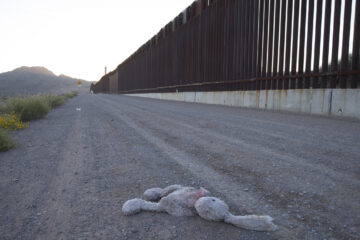Federal Transition Priorities to Defend and Support America’s Children in Immigrant Families
Introduction and Rationale
Anti-immigrant policies advanced by the Trump Administration have caused devastating harm to children in immigrant families and left a moral stain on our country. Children in immigrant families now comprise 1 in 4, or approximately 18 million, of all children in the United States[1] — and their wellbeing matters to our country’s future. Over 5 million children have at least one parent who is undocumented[2] and more than half a million children have a parent who is a DACA or TPS recipient.[3] In effect, this is an entire generation of American children; thus, it is in all our interests to ensure that our policies promote, not undercut, their long-term outcomes.
The onslaught of anti-immigrant policies by the Trump Administration to limit or eliminate access to public benefits, public education, and other critical services have caused immense trauma and toxic stress among children and their families. From increased interior enforcement actions to policy changes like the public charge rule, the result has been more children, including U.S. citizens, losing out on health care, nutrition and other benefits for which they are eligible, and living with constant fear of being separated from family members.[4] For children, the consequences of enduring overwhelming levels of stress, going without sufficient food, irregular access to medical care and other hardships can be deep and lasting. In addition, the ongoing pandemic — which has disproportionately impacted communities of color and immigrants — has intensified these problems. Children in mixed-status families have been largely excluded from federal COVID relief efforts at a time when the pandemic has only exacerbated historical barriers to critical services and supports essential to many of these children.
The extent of harm to children in immigrant families is a national emergency. If left unaddressed the immense trauma and toxic stress experienced by this generation of children will have long-term impacts on their healthy development and ultimately our nation’s future. Every day that we delay reversing course and do not address children’s health, mental health and education is one more day that we are holding them back from the supports they need to grow, thrive and reach their full potential. The next Presidential Administration and Congress have the potential to transform public policies, systems and investments to advance the wellbeing of everyone in our communities. For our collective wellbeing as a nation, children of immigrants must be centered in these efforts.
The undersigned organizations are committed to a society where all children have equal opportunity, including the resources and protections they need to grow and thrive; where diversity is embraced and celebrated; and where all children are valued and cared for regardless of where they or their parents were born. Like all children, children in immigrant families need good nutrition; regular health care; a healthy living environment; and stable, nurturing caregivers to learn and grow.
Federal Transition Recommendations:
Prioritize immigrant families in COVID-19 relief efforts:
- All children and adults in households that file taxes with an Individual Taxpayer Identification Number (ITIN), if otherwise eligible, should receive economic stimulus payments.
- Expand access to health care, including coronavirus testing and treatment and mental health services and support, nutrition assistance, and housing assistance for all immigrants.
- Ensure that the parents of these children – many who find themselves in essential jobs – are able to remain in the country free from the risk of immigration enforcement.
- Provide funding to state and local governments so that they can continue being able to support health, mental health, education, and nutrition services for mixed-status and immigrant families.
Elevate the needs of children of immigrants with the White House and across federal agencies through organizational changes such as:
- Designate a lead champion to represent the interests of children of immigrants in the White House. This could include a designated lead within a White House Office of New Americans and/or White House Office of Children.
- Establish an Office of Immigration and Immigrant Families within the Administration for Children and Families to prioritize and coordinate the needs of children of immigrants within ACF, HHS, and across other federal departments and agencies.
Halt and reform immigration enforcement actions and policies that harm children by utilizing alternatives to detention, increased protections and assistance for immigrants, and greater oversight of immigration enforcement officials.
- Review policies and procedures to the extent to which they impact family unity, parental rights for care and custody of children, and child wellbeing.
- Redesign policies with a focus on family unity, including appropriate protections and procedures that minimize harm and consider the best interests of children during all stages of immigrant enforcement actions, and ensure DHS hires professionals with child welfare and development expertise.
- Strengthen sensitive locations guidance and report a plan to ensure training on the new policy, effective implementation, and a process of accountability for violations before any enforcement actions resume.
- Rewrite existing return policies to ensure a right to return to the United States for immigrants who have been deported from their families and communities.
Restore and fully implement DACA and TPS and create permanent protections and pathways for citizenship for immigrants, including undocumented immigrants, Dreamers, and TPS holders.
- Renew work authorizations for immigrants, including Dreamers and TPS holders.
- Expand access to counsel and legal services to help families in evaluating their legal options.
Increase access to core public benefit programs by undoing the deeply harmful public charge regulation and funding community-led outreach and education on access to public benefits.
Increase access to affordable and high-quality health care by expanding eligibility to health care programs, establishing and promoting culturally competent care, addressing language barriers, and removing fears of immigration enforcement.
- Ensure that children are caught up on vaccines and access to other preventative care, including identification and diagnosis of developmental delays and disabilities that have been missed due to the pandemic, with special attention to outreach in immigrant communities and language access.
- Encourage states to take up CHIPRA options to cover immigrant pregnant women and children.
- Create an outreach and enrollment campaign to reach immigrant communities that shows the array of benefits covered in Medicaid and CHIP.
- Fund and support outreach to families of immigrants through the Parent to Parent Mentor program that trains community-based parents to help other parents enroll their children in Medicaid and CHIP. Utilize the Parent to Parent Mentor program to guide parents of newly enrolled children to access all available services including well-child visits, dental care, and mental health services.
- Increase community-based staff training and awareness of the mental health needs of children in immigrant families, as well as supporting mental health intervention and prevention resources.
Remove barriers to child care, early education, and pre-K-12 education for children in mixed-status families, by increasing funding, improving educators’ cultural competency, addressing language barriers, and removing fears of immigration enforcement and other negative immigration consequences.
- ED and HHS should issue joint guidance on increasing access to quality public pre-K-12 education and child care and early education programs across all settings for immigrant students and families, including assurances on privacy protections.
- Congress should address broadband and technology needs in all communities to ensure all immigrant pre-K-12 students have access to the Internet (including devices and Internet service), to engage in teaching and learning whether in the physical classroom or remotely; thereby closing the Homework Gap.
- Fund resources to address trauma and healing, including providing professional development and supports for educators to provide trauma-informed care, for children in immigrant families in schools, community-based programs, and family child care homes.
- The FY 22 budget should include major investments in programs that support children’s healing including child care, Head Start, Early Head Start, and mental health services.
Increase access and remove barriers to nutrition programs.
- The Food and Nutrition Service (FNS) should maximize flexibilities under SNAP, WIC, school meals and P-EBT and provide TA to states on how to best use them to increase access to nutrition assistance to all eligible families.
- FNS should look for opportunities to make permanent flexibilities that have been granted under COVID-19, such as allowing remote certification for WIC.
Ensure children in mixed-status families have safe and adequate housing, by expanding access to housing assistance free from immigration enforcement fears.
Address climate change through the lens of children in mixed-status families by supporting policies and regulations which improve access to clean air and water and create protections for communities living in areas or working in industries disproportionately impacted by climate change.
Expand the Child Tax Credit and Earned Income Tax Credit to include all children regardless of immigration status by including children in households that file taxes with an Individual Taxpayer Identification Number (ITIN).
[1] Jeanne Batalova, Brittany Blizzard, and Jessica Bolter, “Frequently Requested Statistics on Immigrants and Immigration in the United States,” Migration Policy Institute, February 14, 2020, https://www.migrationpolicy.org/article/frequently-requested-statistics-immigrants-and-immigration-united-states#Children%20of%20Immigrants
[2] Randy Capps, Michael Fix, and Jie Zong, “A Profile of U.S. Children with Unauthorized Immigrant Parents,” Migration Policy Institute, January 2016, https://www.migrationpolicy.org/research/profile-us-children-unauthorized-immigrant-parents
[3] Nicole Prchal Svajlenka, “What We Know About DACA Recipients in the United States,” September 5, 2019, https://www.americanprogress.org/issues/immigration/news/2019/09/05/474177/know-daca-recipients-united-states/
[4] Beyond the Border: Family Separation in the Trump Era, UnidosUS, 2019, http://publications.nclr.org/handle/123456789/1915; Wendy Cervantes, Rebecca Ullrich, and Vanessa Meraz, The Day That ICE Came: How Worksite Raids Are Once Again Harming Children and Families, Center for Law and Social Policy, 2020, https://www.clasp.org/publications/report/brief/day-ice-came-how-worksite-raids-are-once-again-harming-children-and
Local Organizations
Canal Alliance, CA
Casa San Jose, PA
Central American Resource Center, D.C.
Child Care Resources, Inc., MT
Cincinnati Senegalese Union, OH
Cleveland Jobs with Justice, OH
Coalition for Asian American Children and Families, NY
Colorado Latino Leadership, Advocacy, & Research Organization (CLLARO)
Committee for Hispanic Children and Families, NY
Community Action Marin, CA
El Colegio Charter School, MN
Encuentro, NM
Heartfelt Tidbits, Inc., OH
Hispanic Services Council, FL
Interfaith Welcome Coalition of San Antonio, TX
KIPP SoCal Public Schools
La Paz Chattanooga, TN
Latino Community Center, PA
Latino Memphis, TN
Lawrence CommunityWorks, MA
Los Angeles Regional Food Bank, CA
Maternal and Child Health Access, CA
Motivation Motivates, OH
Neighborhood House, WA
Northwest Side Housing Center, IL
One Stop Career Center of PR Inc.
Puentes de Cristo, TX
Puget Sound Educational Service District, WA
San Antonio Region Justice For Our Neighbors, TX
Seattle Educare, WA
Seattle/King County Coalition on Homelessness, WA
Simakovsky Law, OH
The HANA Center, IL
West Central Initiative, MN
West Valley Neighborhoods Coalition, AZ
Workers Center of Central New York
State Organizations
Advocates for Basic Legal Equality, Inc., OH
Advocates for Children of NJ
Advocating Opportunity, OH and TN
Alabama Arise
Alabama Coalition for Immigrant Justice
Alabama Institute for Social Justice
American Academy of Pediatrics, Colorado Chapter
American Academy of Pediatrics, New York State
Arizona Association for the Education of Young Children
Arizona Center for Economic Progress
Arizona Chapter of the American Academy of Pediatrics
Arkansas Advocates for Children and Families
Asian Resources, Inc, CA
California WIC Association
Californians Together
Center for Children’s Initiatives, NY
Child Care Resources, WA
Child Care Services Association, NC
Children at Risk, TX
Children Now, CA
Children’s Action Alliance, AZ
Children’s Defense Fund of Texas
Children’s Institute, OR
Children’s Advocacy Alliance, NV
Clayton Early Learning, CO
Coalition for Humane Immigrant Rights (CHIRLA), CA
Colorado Children’s Campaign
Common Good Iowa (Formerly the Child and Family Policy Center)
Conexión Américas, TN
CTFO, CA, TX and NY
Every Texan
Florida Chapter of American Academy of Pediatrics, Inc.
Food Lifeline, WA
Greater Birmingham Ministries, AL
¡HICA!, AL
Illinois Action for Children
Illinois Coalition for Immigrant and Refugee Rights
Jolt Action, TX
Juvenile Justice Coalition, OH
Kansas Action for Children
KIDS FORWARD, WI
Latino Coalition for a Healthy California
Latino Policy Forum, IL
Louisiana Policy Institute for Children
Lutheran Social Services of the National Capital Area, MD, VA, D.C.
Maine Business Immigration Coalition
Mexican American Unity Council, Inc, TX
National Association of Social Workers – Texas Chapter
NC Child
Nebraska Appleseed
New Mexico Center on Law and Poverty
Ohio Hispanic Coalition
Ohio Immigrant Alliance
Oregon Association for the Education of Young Children
Our Children Oregon
Partners for Our Children, WA
PASOs, SC
Progressive Leadership Alliance of Nevada
Rhode Island KIDS COUNT
SC Appleseed Legal Justice Center
Schuyler Center for Analysis and Advocacy, NY
Stockton University Child Welfare Education Institute, NJ
Tennessee Justice Center
Texas State Teachers Association
The Children’s Partnership, CA
TODEC Legal Center, CA
Virginia Chapter, American Academy of Pediatrics
Voices for Utah Children
Voices for Vermont’s Children
Volunteer Lawyers for Justice, NJ
Washington State Parent Ambassadors
Wind of the Spirit Immigrant Resource Center, NJ
Zero to Five Montana
National Organizations
A Better Balance
Abriendo Puertas/Opening Doors
African American Ministers In Action
Alianza Nacional de Campesinas
All Our Kin
American Federation of Teachers (AFT)
American Psychological Association
Boston College School of Social Work
Bridges Faith Initiative
BUILD Initiative
Center for Law and Social Policy (CLASP)
Center for the Study of Social Policy
Children’s Defense Fund
Church World Service
Clearinghouse on Women’s Issues
Coalition on Human Needs
Congregation of Our Lady of Charity of the Good Shepherd, U.S. Provinces
Disciples Refugee & Immigration Ministries
Early Opportunities
Educare Learning Network
Families USA
Feminist Majority Foundation
First Focus on Children
Food Research & Action Center
Franciscan Action Network
Freedom Network USA
Futures Without Violence
Haitian Bridge Alliance
Hispanic Federation
Impact Fund
InterReligious Task Force on Central America and Colombia
Justice for Migrant Women
Kids in Need of Defense (KIND)
KIPP
Leadership Conference of Women Religious
League of United Latin American Citizens (LULAC)
Low Income Investment Fund
MomsRising
National Advocacy Center of the Sisters of the Good Shepherd
National Association for the Education of Young Children
National Association of Social Workers
National Center for Lesbian Rights
National Center for Youth Law
National Council on Independent Living
National Crittenton
National Education Association
National Employment Law Project
National Immigration Law Center (NILC)
National Juvenile Justice Network
National Migrant and Seasonal Head Start Association
National Network for Immigrant & Refugee Rights
National Parents Union
National Partnership for New Americans
National WIC Association
NETWORK Lobby for Catholic Social Justice
Next100
Partnership for America’s Children
Prevention Institute
Public Advocacy for Kids (PAK)
RESULTS
Shriver Center on Poverty Law
Sisters of Mercy of the Americas Justice Team
Start Early
T’ruah: The Rabbinic Call for Human Rights
The Coelho Center for Disability Law, Policy and Innovation
The Education Trust
U.S. Committee for Refugees and Immigrants
UnidosUS
Union for Reform Judaism
United Migrant Opportunity Services/UMOS Inc.
United Parent Leaders Action Network (UPLAN)
Young Center for Immigrant Children’s Rights
ZERO TO THREE


